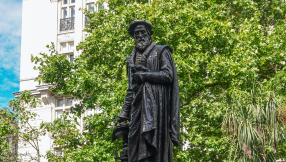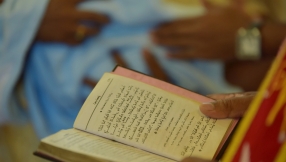
Jewish academic and Hebrew scholar Irene Lancaster explains the Jewish perspective of sacrifice in the Old Testament, particularly through the accounts of Jephthah and Micah.
During the current month of Tammuz we are reading the Book of BeMidbar ('In the Desert' i.e. Numbers). The accompanying readings appear to have something in common: they deal on the whole with various interpretations of personal sacrifice.
These readings - the Haftorot - balance the emphasis on both ritual and personal courage in evidence throughout the Book of BeMidbar. They remind us that ritual and personal courage need the sacrifice entailed in preserving home, family and community.
The Sedra of Hukkat (BeMidbar (19:1-22:1) depicts the death of Moses' elder siblings, Miriam and Aaron. These siblings helped keep the family together, as well as the wider community of freed slaves. The accompanying Haftorah is that of Jephthah (Judges 11: 1-33).
This is the tale of an aggrieved child from the people of Gilead, who is spurned by his siblings and 'driven out' from the home. Yet, he is a 'mighty man of valour'. This is a common theme in Biblical narrative. Joseph and David are also driven out and yet become leaders of the Jewish people, for posterity.
Jephthah lived 'in the land of Tov' ('good'). Jephthah’s name signifies 'openness' and he 'collected empty people' as followers. In fact, the Hebrew verb used to depict 'collected' is only found in this passage and is related to the idea of 'gleanings' or 'bits and pieces'. In other words, Jephthah appears to have no boundaries and is therefore open to negative influences. This is in contrast to Joseph and David.
However, possibly in desperation, the Gilead people now need Jephthah because of his physical prowess and approach him. The Ammonites are about to attack. Jephthah agrees to lead the Gilead's army but only if he is appointed supreme leader of the people, in addition to leading the army. G-d is invoked as 'witness' to this promise made to Jephthah.
Before embarking on war, Jephthah remembers the rules set down by Jacob in conjunction with his estranged twin brother Esau: first offer gifts, before starting a fight. But Ammon turns him down. They state incorrectly that on leaving Egypt, the Children of Israel travelled through their own lands without permission. Jephthah puts them right, as stated in the accompanying Sedra (BeMidbar 20:14 ff). He even refers to Balak, King of Moab, an ally of Ammon (Judges 11:25), who 'didn't even argue or fight against Israel'. Moreover, 300 years have elapsed between the time referred to by Ammon and now; if the Ammonites have a real case against Gilead, why wait so long?
Having exhausted every argument, with Divine assistance, Jephthah 'crosses over' to defend Gilead. But the idea of victory goes to his head. He is not trained to deal with it. For he makes a rash promise that if G-d delivers Ammon 'into my hand' then (v 31) 'whatever comes out of the doors of my house to meet me on my return in peace ... will be the Lord's and I will offer it up as a burnt offering.'
This is where the Haftorah ends. But everyone knows what happens next. On return, Jephthah is met by his joyous only child, his daughter. Knowing what he has done, he first blames his daughter for her own predicament (shades of Adam blaming Eve in the Garden of Eden).
But then the daughter offers herself up as a sacrifice, because 'My father, you opened your mouth to the Lord. Do to me what came out of your mouth...' There is a hint here of Jephthah's name, meaning 'open' and also a reference to verse 31, where Jephthah states that he will sacrifice 'whatever comes out of the doors of my house ....’ It appears that Jephthah's daughter is far wiser than her father and knows his limitations. If only he hadn't made a rash promise and had kept his mouth shut!
Jephthah therefore won the battle against the Ammonites but not the war. For, by sacrificing his only daughter, he ensured that his family line came to an abrupt end.
This theme is developed in the subsequent Haftorah. Here we have the Sedra of Balak (BeMidbar 22:2-25:9). As we have seen, Jephthah has already referred to Balak in his arguments against the Ammonites in the previous Haftorah. Balak ('devastator') hires the false prophet Bilam (meaning 'to swallow up') to curse the Children of Israel.
Bilam has a miraculous turnaround, when instead of cursing, he blesses. In fact his blessing (BeMidbar 25:5-9 'How goodly are your tents, O Israel') has been incorporated into the Jewish prayer service and is one of the most famous and loved passages of all!
This blessing ends (v 9) with the depiction of Israel as both a lion and a lion cub (or lioness, depending on the translator!), who once roused ...! 'Blessed be those who bless you and cursed be those who curse you.'
Before that (BeMidbar 23), on Bilam's advice, King Balak had offered sacrifices to G-d, but in vain. As in the case of Jephthah, this idea of sacrifice was crude and manipulative, and didn't work for the G-d of Israel: 'For behold, it is a people that dwell alone...' (v 9).
If we turn to the accompanying Haftorah of Micah 5:6-6:8, we learn the true meaning of sacrifice. Speaking in the 8th century BCE, the prophet Micah concentrates on attacking those who accumulate wealth for its own sake, such as corrupt rulers and judges, together with venal priests and prophets. In other words, Micah attacks those who run society by practising self-aggrandisement at the expense of the exploited.
Thus, Micah appears to be both contemporary and on the ball. He knows that power can corrupt if not properly handled. In his own time, corruption wasn't necessarily rash, as in Jephthah, nor primarily a question of sacrificing to 'false gods'. It was more a question of personal relationships and how societies can both rise and fall due to greed, avarice and self-satisfaction.
If Bilam recognized that the Children of Israel were G-d's people, Micah emphasizes that this doesn't mean resting on one's laurels. The corruption endemic in 8th century BCE society led to the defeat and exile of the Kingdom of Judah: the destruction of the First Temple and the exile to Babylon in around 586 BCE. However, the Northern Kingdom was defeated by Assyria in around 722 BCE and the people deliberately assimilated, so that Judaism in that part of the Land died out.
In the last line of our Haftorah, Micah spells out the deceptively simple requirements needed to fulfil G-d's will: to support the underdog and not to brag.
First, Micah describes how the Judean exile in Babylon - and elsewhere - will give the Jewish people the opportunity to influence 'many great peoples, as dew from the Lord and as showers on the grass.' Cleverly, the word for 'showers' here is a play on the word for 'great and many', where 'rav' becomes the diminutive 'revivim'. Trickles of goodness will replace the pomp and circumstance associated with power and might. In addition, in contrast to this country, tiny showers are rare in the Middle East, and I'm not sure there even is a word for 'drizzle' in Hebrew. When it rains, it really rains. Otherwise, the heat, and often humidity, are intense. Winds aren't generally breezes (except at night in Jerusalem) but generally overwhelm. Therefore these small acts of kindness are often unexpected and Jews will influence in ways that are not always obvious.
And then in verse 5:7, Micah reiterates Bilam's words, 'And the remnant of Jacob shall be among the nations, in the midst of many/great peoples as a lion among the beasts of the forest, as a lion cub among the flocks of sheep.' Ultimately, the Jewish people will prevail over their enemies.
In Chapter 6:1-8, leading up to what G-d requires of humanity, the scene is set as a courtroom, with G-d as the plaintiff and the Children of Israel as the defendant. The mountains and hills are judge and jury!
G-d first charges Israel with ingratitude (v 3). 'Oh, My people, what have I done to you and how have I overwhelmed you ... ? Go on, testify against Me!' And then G-d reminds the people that, led by Moses, Aaron and Miriam, He, G-d, had taken them out of Egypt. This is a reminder of the previous week's Sedra depicting the death of Aaron and Miriam.
Then G-d refers to the parallel Sedra: even Bilam had testified against Balak in defence of the Jewish people and had turned the intended curses into blessings. In addition, hasn't G-d brought them into the Land as promised?
Then, from 6:6-7, Israel, the defendant, says that they don't have a defence. Unlike Bilam, they know very well that no amount of animal sacrifices will help. They know that animal sacrifice is not enough. The questions they put to G-d are rhetorical. They expect a negative response. That is why the numbers are exaggerated. 'Does the Lord really desire thousands of rams, tens of thousands of rivers of oil?' Here the word for 'tens of thousands' (rvvot) reminds us of 'revivim', the small 'trickles' that G-d prefers to the many and mighty.
The people are being sarcastic. They then remind us of Jephthah's recent tragedy due to rashness. 'Shall I really give my first-born for my transgression, the fruit of my womb for the sin of my soul?' It may even be that the defendant, Israel, is reminding G-d, the plaintiff, of His own demand that His beloved Abraham should himself sacrifice his beloved Isaac to Him, which was nipped in the bud at the last moment.
The people know that spiritual sins need psychological cures, not the supreme sacrificial zeal that will have repercussions affecting the next generation.
It is the individual here and now who has to change, and Micah responds (v 8) that they know very well 'what the Lord requires of you; nothing more or less than to do justice, love kindness and walk with your G-d without affectation.'
This very famous injunction is nothing new for the Jewish people, and certainly not progress in their thought, as many non-Jewish commentators have suggested.
The Jewish people already knew in their hearts that sacrifices and ostentation do not move G-d. Sacrifices carried out with the right attitude of modesty were to be continued while the Temple still stood. But the lesson to be learned is that how we do things is just as important as the end goal. Sacrifices can be misjudged, and then others (often our children and grandchildren) will suffer. In Chapter 6:8, Micah reminds the Jewish people that the quality of our everyday behaviour is paramount, and it is the 'small trickles' that count.
The order of G-d's requirement is important. Justice comes first but shouldn't be over-zealous. Mercy translated into kind deeds tempers justice and equates to love. And how we treat our relationship to G-d is in many ways the most significant requirement of all. 'Without affectation' is a possible approximation of a very difficult term, which appears only here and in Proverbs 11:2, where this quality brings wisdom.
Straight after this reading in the synagogue we commemorated the Fast of Tammuz, which ushers in 'The Three Weeks'. This is a sad period, reminding us of the Destruction of both Temples (the second in 70 CE), which started on Sunday July 13 (17 Tammuz) with the breach of the Temple.
Micah's prophecy of hope has become very famous in the wider world, but is often cited to the detriment of the Jewish people. It is to be hoped that placing the prophet's words in context will help demonstrate that the Hebrew Bible is not a chronological historical document of progress, but a holistic blueprint of how we should live our lives in all its complexity.
Its greatness lies not in pious platitudes but in a real understanding of how human beings function, of how society works and of how difficult it is to simply live in the world and survive. Micah's prophecy is therefore as relevant today as it was in the 8th century BCE.













